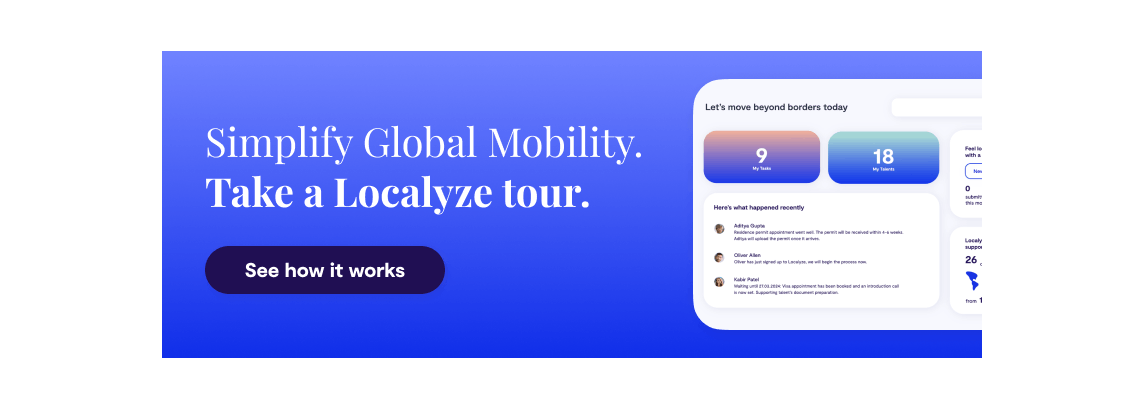Do you work for a European company currently defining a global mobility strategy or considering growing an international team? If so, you will have to navigate the sometimes tricky world of visas and work permits when hiring international talent, but don't worry — this ultimate guide will tell you all you need to know about work permits in Europe.
There are several options for work permits in Europe, varying from country to country. One of the most commonly issued work permits is the EU Blue Card. The Blue Card is available in 25 of the 27 EU member states, with Denmark and Ireland being the exceptions.
The EU Blue Card was introduced to fill skill shortages in Europe's labor markets, minimize bureaucracy, and enhance alignment within the EU. This work permit gives highly qualified workers from outside the European Union the right to live and work in a member state and grants them the ability to:
- Travel freely within the EU
- Bring family members
- Access to the same working conditions and social benefits as EU citizens
- Apply for permanent residency
The EU Blue Card is just one of many available European work permits. Each country has its own unique permits that international talent can apply for when taking up employment. This article will provide an overview of work permits in Germany, Austria, the Netherlands, Spain, Ireland, the UK, and Portugal.
Germany: The work visa for highly qualified professionals
Aside from the Blue Card, one of the most commonly issued German work permits is the work visa for qualified professionals. It is available to professionals who have attended an institution of higher education or received qualified vocational training outside of Germany and wish to obtain employment in Germany.
This visa or residence permit is issued for a maximum of four years. If a work contract has a shorter duration, the residence permit is granted for the duration of the contract.
Who qualifies as a skilled worker in Germany?
These are the requirements for the work visa for qualified professionals:
- Qualifications must be recognized in Germany or be comparable to those from a German higher education institution.
- A concrete job offer from a company in Germany.
- If you are over 45 and coming to Germany for employment for the first time, the gross annual salary for the position in question must be at least EUR 46,530 (in 2022). Alternatively, proof of adequate old-age pension provisions can be provided.
- Approval of the Federal Employment Agency (BA) is required.
- It must be demonstrated that no preferential workers (nationals of EU member states or the EEA States) are available for the job.
- The conditions of employment must be comparable with those of domestic employees.
Austria: the Red-White-Red Card
Aside from the EU Blue Card, the most common work permit in Austria is the Red-White-Red Card. The following groups are eligible to apply:
- Very Highly Qualified Workers
- Skilled Workers in Shortage Occupations
- Other Key Workers
- Graduates of Austrian Universities and Colleges of Higher Education
- Self-employed Key Workers
- Start-up Founders
The Red-White-Red Card is issued for a period of 24 months and entitles holders to fixed-term settlement and employment by the employer specified in the application.
What is the minimum salary for red-white-red card in Austria?
To apply for the Red-White-Red Card, applicants must have a fixed and regular income to cover their living costs. Here's the required monthly income as of January 2023:
- For singles: € 1,110.26
- For couples: € 1,751.56
- An additional € 171.31 for each child
Applicants must also have health insurance which provides benefits in Austria, and provide proof of accommodation or housing.
The Netherlands: The Highly Skilled Migrant Permit
The most commonly issued work permit in the Netherlands is the Highly Skilled Migrant Permit. The Immigration and Naturalisation Service (IND) defines a Highly Skilled Migrant as an employee who works for a recognized sponsor in the Netherlands based on a work contract. The employee must fulfill specific criteria, such as age, salary, and experience requirements.
The EU Blue Card and the Highly Skilled Migrant Program require an employment contract with a company in the Netherlands. Whereas the EU Blue Card requires an employment contract of at least a year, the Highly Skilled Migrant permit requires a three-month contract.
What is the salary requirement for skilled worker visa in the Netherlands?
Besides, the highly skilled migrant needs to meet the following salary criteria (the year 2023):
- Highly skilled migrants 30 years or older: €5.008 gross per month
- Highly skilled migrants younger than 30 years: €3,672 gross per month
- Reduced salary criterion: €2,631 gross per month
- Blue Card: € 5,867 gross per month
If you want to hire your employee as a Highly Skilled Migrant in the Netherlands, you must become a recognized sponsor by the IND. To become a sponsor, you must fulfill specific criteria and qualifications, including being reliable and financially healthy. After the recognition process, your company will be included in the Public Register for Recognised Sponsors. Keep in mind that only organizations can become recognized sponsors - not people.
What are the benefits if your company becomes a sponsor?
- The IND handles the applications more quickly - usually, the decision process takes around two weeks.
- As the employer, you need to provide fewer supporting documents with the application. Your declaration that your new employee meets the conditions is usually sufficient.
- You can submit online applications in the Business Portal.
The process of becoming a sponsor might take from 30 to 90 days. Once you receive the positive sponsorship confirmation, you can start hiring internationally. You don't need to become a sponsor if your employee applies for the Blue Card.
Spain: Residence Visa for Highly Skilled Professionals
One of the main work permits in Spain is the Residence Visa for Highly Skilled Professionals.
What is a highly qualified professional in Spain?
This visa grants residence and work authorization to the following groups:
- Management or highly qualified staff of large businesses, corporate groups, or SMEs in strategic sectors.
- Management of highly qualified staff of business projects in the general interest.
- Graduates, postgrad
How long does it take to get a highly qualified professional visa in Spain?
One of the main benefits of this work permit is the streamlined processing. The visa decisions are made and notified within ten working days. The residence permit decisions are generally completed within 20 days.
The United Kingdom: Skilled Worker Visa
The United Kingdom does not participate in the Blue Card scheme, but other UK work permit options are available for your talent. Especially post-Brexit, hiring internationally within the UK is a very relevant but also complex topic.
The Skilled Worker Visa is a common option to employ someone in the UK. In this case, you, as the employer, must obtain a sponsorship license first. Find out if your business is eligible here. After becoming a sponsor, all visa applications are handled through the Sponsorship Management System, for which you need to assign users respectively.
Who is eligible for skilled work visa in the UK?
Your employee needs to meet the following criteria to be eligible for the skilled worker visa:
- Have a 'certificate of sponsorship' from you, the employer, with information about the role offered in the UK.
- Have a job that's on the list of eligible occupations.
- Be paid a minimum salary, which can vary depending on the occupation.
- Prove knowledge of the English language when applying.
Different fees are usually charged when applying for a skilled worker visa, including the Certificate of Sponsorship fee, the immigration skills charge, the visa application fee, and the healthcare surcharge.
Ireland: The Critical Skills Employment Permit
The Critical Skills Employment Permit is for skilled workers qualified in professions with a shortage of skills in Ireland.
What are the requirements for work permit in Ireland?
To apply for a Critical Skills Employment Permit or support your employee with the permit, you need to check the following criteria:
- The employee must have the relevant qualifications, skills, and experience required for the job.
- An annual salary of at least €32,000 a year in an occupation that is on the Critical Skills Occupation List
- A yearly wage of €64,000 year in a domain that is not on the list of ineligible occupations
- The job offer must be valid for two years or more.
You cannot get a work permit for a company where more than 50% are non-EEA nationals. However, this requirement can be waived if your company is a start-up supported by Enterprise Ireland.
Portugal: The Portugal Highly Qualified Activity Visa
The Portugal Highly Qualified Activity Visa is a visa for highly-qualified professionals.
What is a highly qualified activity in Portugal?
The Portuguese government defines highly-qualified work as: "That whose exercise requires specialized technical skills of an exceptional nature or an adequate qualification for the respective exercise." For example:
- Information and communication technology Professionals
- Management positions such as Directors and Chiefs
- Scientific researchers, professors, and PhD students in Portugal
- Science, Engineering, and Health professionals
- Legal, Social, and Cultural Professionals with expertise
What are the benefits of a highly qualified activity visa in Portugal?
The Portugal HQA visa enables holders to live in Portugal with the same fundamental rights as Portuguese citizens and access to the country's public health system and other social services. Additional benefits include the ability to:
- Apply for a residence permit valid for one year and then renew every two years.
- Move freely through the countries that comprise the European Union and Schengen area.
- Apply for an EU Blue Card after complying with its requirements.
- Bring family members.
- Apply for Portuguese citizenship after legally living in the country for more than five years.
- To apply for the Portugal HQA visa, applicants must have a work contract or job offer with a salary of at least 1.5 times the average national gross annual salary.
The bottom line
When managing an international team, knowing what options are available regarding work permits/visas is critical. There are several options for international talent who hope to work in Europe. Ultimately, the right choice will depend on professional qualifications and individual circumstances.
Want to know more about work permits in Europe? Need help supporting employees with the visa process? Get in touch with us!
Please note: this article was originally published in 2021 and updated in 2023.
The contents of our website, specifically the articles discussing legal topics, are researched with the utmost care. However, we cannot assume any liability for the correctness, completeness, and topicality of the information provided. In particular, the information is of a general nature and does not contain legal advice in individual cases. For the solution of specific legal matters, please consult a lawyer.




